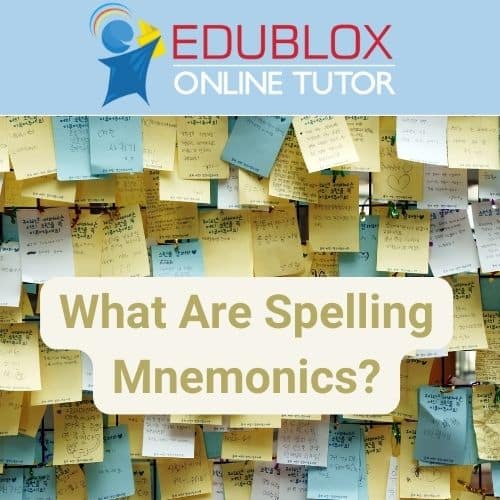
Defined broadly, a mnemonic is a device, procedure, or operation used to improve memory. Defined in narrow terms — and what is usually meant by the word — a mnemonic is a specific reconstruction of target content intended to tie new information more closely to the learner’s existing knowledge base and facilitate retrieval.
There are a variety of mnemonic techniques, including keywords, peg words, acronyms, acrostics, loci methods, spelling mnemonics, phonetic mnemonics, number-sound mnemonics, and Japanese “Yodai” methods.
Spelling mnemonics are intended to help us remember the spelling of words. For example, to remember that the word “cemetery” is spelled with three e’s, one can picture a lady screaming ‘e-e-e’ as she walks past the cemetery. Below are several more examples.
Spelling mnemonic examples
affect/effect:
Use the word RAVEN to remember when to use “affect” versus “effect”.
R emember
A ffect
V erb
E ffect
N oun
again and Britain:
To remember the ain in agAIN and BritAIN: It is rAINing in BritAIN agAIN.
argument:
Argument or arguement? I lost an ‘e’ in an argument.
arithmetic:
Use the first letter of each word: A Rat In The House May Eat The Ice Cream.
ascertain:
When you ascertain a fact, be AS CERTAIN as you possibly can.
beautiful:
BEAUtiful > Big Elephants Are Ugly.
because:
Use the first letter of each word: Big Elephants Can Always Understand Small Elephants.
believe:
I do not beLIEve a LIE.
birthday, first, bird, girl, dirty:
To remember the IR in these words: The dirty girl got a bird for her first birthday.
bookkeeper:
Triple compound: oo kk ee
cemetery:
To remember that the word “cemetery” is spelled with three e’s, one can picture a lady screaming ‘e-e-e’ as she walks past the cemetery.
complement/compliment:
Complement adds something to make it enough; compliment puts you in the limelight.
decide:
I decided to join the C.I.D.
desert/dessert:
Remember that a desert is Sandy; dessert has two s’s in it, like Sweet Stuff.
dilemma:
Emma faced a dilEMMA.

does:
Use the first letter of each word: Daddy Only Eats Sandwiches.
eight:
Use the first letter of each word: Every Indian Goes Home Tonight.
friend:
Use the first letter of each word: Fred Rushed In Eating Nine Doughnuts.
Or remember: I fried my friend on FRIday and that was the END of him.
geography:
Use the first letter of each word: George’s Elderly Old Grandfather Rode A Pig Home Yesterday.
hear/here:
You HEAR with your EAR.
innocent:
IN NO CENTury is murder an innocent crime.
island:
An island IS LAND surrounded by water.
laugh:
Use the first letter of each word: Laughing Aunts Under Green Hats.
liar:
That LIAR looks famiLIAR.
light, night, right, might, fight:
Use the first letter of each word to remember the IGHT in these words: I Go Home Tonight.
necessary:
Use the first letter of each word: Never Eat Crisps, Eat Salad Sandwiches, And Remain Young!
Or remember that neCeSSary has one C and two S’s remember one collar and two sleeves.
measurement:
Be SURE of your meaSUREments before you start work.
Mississippi:
Say to yourself: “M I double S, I double S, I double P, I”.
mnemonics:
Use the first letter of each word: Mnemonics Now Erase Man’s Oldest Nemesis, Insufficient Cerebral Storage
necessary:
Use the first letter of each word: Never Eat Crisps, Eat Salad Sandwiches, And Remain Young!
ocean:
Use the first letter of each word: Only Cats’ Eyes Are Narrow.
people:
Use the first letter of each word: People Eat Omelettes, People Like Eggs
pieces:
PIEces of a PIE.
police and notice:
To remember the ICE in police and notice: There was a police notice to say it was not ice.
potassium:
Remember one tea, two sugars.
principal/principle:
Your princiPAL is your PAL; A ruLE can be called a principLE (both end in –le).
rhythm:
Use the first letter of each word: Rhythm Helps Your Two Hips Move.
said:
Use the first letter of each word: Snakes And Insects Dance
sculpture/sculptor:
A sculPTURE is a kind of piCTURE.
separate:
There was a farmer named Sep and one day his wife saw a rat. She yelled, “Sep! A rat – E!!!”
Or remember: Always smell a rat when you spell separate.
slaughter:
Slaughter is LAUGHTER with an S at the beginning.
special:
The CIA has special agents.
stationary/stationery:
Stationery contains er and so does paper; stationary (not moving) contains ar and so does car.
together:
Remember how to spell “together” by noting that if you GET HER, you’ll be “together.”
Or remember: We’re going to get her together.
tomorrow:
Use the first letter of each word: Trails Of My Old Red Rose Over Window.
would, could, should:
To remember the OULD in would, could, and should: O U Lucky Duck
young:
YOU are YOUng.
Make your own spelling mnemonics

You can also make up your own spelling mnemonics. A good spelling mnemonic can be anything that helps you remember a spelling word. Below is an example:
- Take each letter of a spelling word.
- Make a sentence with the spelling word, sequentially using each letter in the spelling word at the beginning of the words in the sentence.
- It’s a good idea to assign the spelling word to the first word in the sentence, such as Rhythm Helps Your Two Hips Move to learn the spelling word rhythm.
Spelling mnemonics and learning disabilities
Teaching spelling mnemonics to children with learning disabilities might be “less successful.” There are at least two problems in teaching mnemonics to children with learning disabilities:
- The first problem is that it overlooks the sequential fashion of learning. Mnemonics instruction is, to a large extent, instruction in memory techniques, which should be taught only after the skill of memory has been learned. It can be compared to a child being taught soccer tactics, such as the “wall pass,” while they have not yet adequately mastered the skill of passing the ball. As stated in Knowabout Soccer, “No matter how good your passing technique, if the quality of your passing is poor, your technique will not be effective.”
- The second problem is that by teaching the child to use memory crutches, the result is that, “on more complex applications, generalization attempts [are] less successful” (Scruggs & Matropieri, 1990). If the skill of memory is taught, however, the child can apply it in any situation.
Edublox programs teach — among other skills — the skill of memory, which makes it possible for a child to apply their memory in any situation.
.



